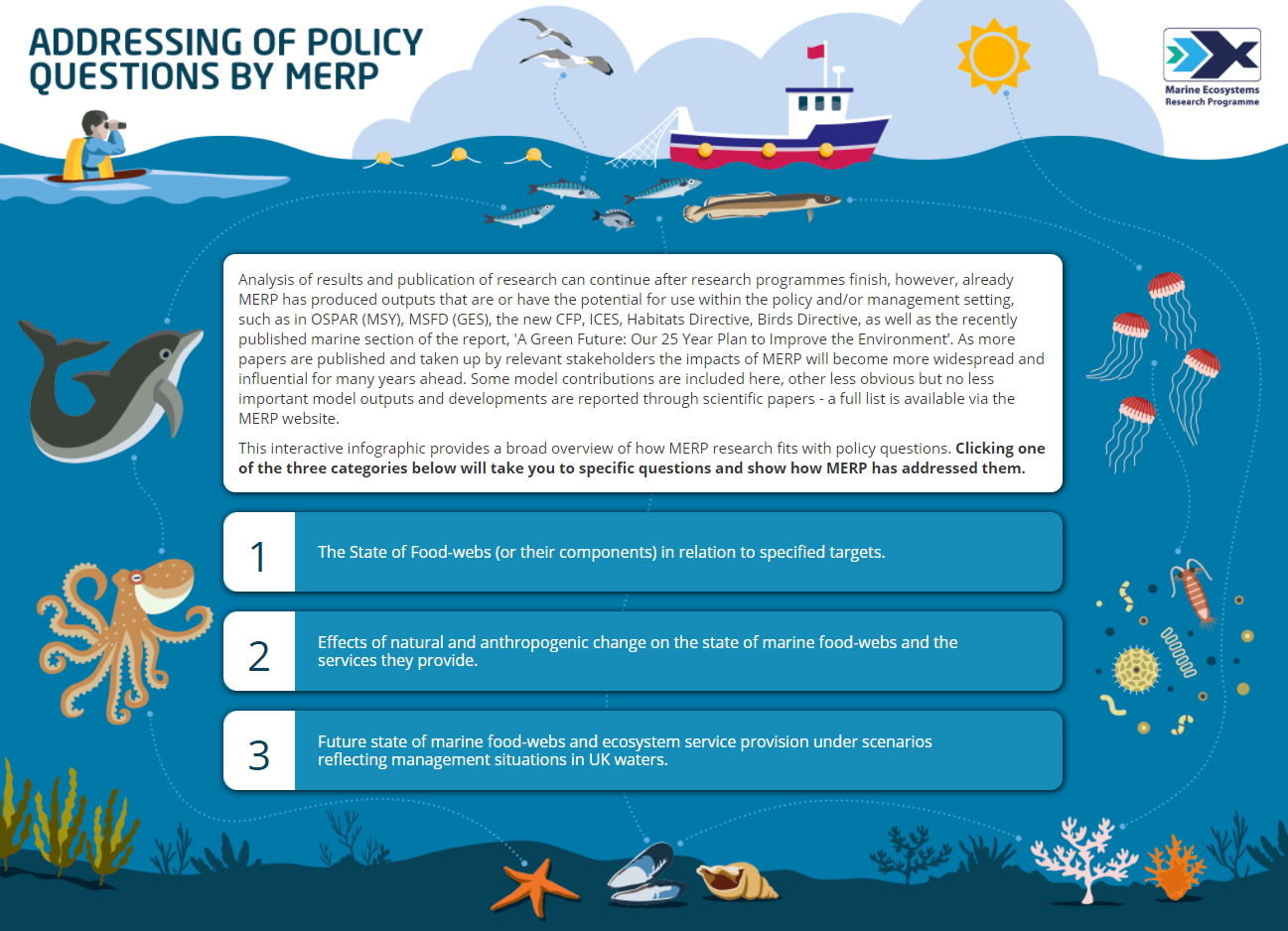The Natural Environment Research Council (NERC)/Department for Environment, Food and Rural Affairs (Defra) - funded Marine Ecosystems Research Programme set out to integrate existing marine data and target new data with current models and knowledge of marine ecosystem services, in order to improve our understanding of the whole UK marine ecosystem.
 The 5 year, £5 million programme has brought together more than 50 scientists from 12 research institutes and a large number of supporting organizations that have made data and expertise available to achieve MERP’s aim. The strength of MERP and the quality of its outputs are a testament to the approach which: brought together scientists with different expertise and experience to work together; utilised and developed the best available modelling approaches; merged existing data from a range of sources and added new data where necessary; linked process understanding and ecosystem state to services; and related its outputs to better understanding relevant to policies. It has been an underlying target that MERP would bring together and further develop a suite of marine ecosystem models, provide vital evidence and tools and advice to support Marine Strategy Framework Directive (MSFD), the Marine and Coastal Act Access Act, the Marine (Scotland) Act, the Common Fisheries Policy (CFP) and inform the OSPAR Joint Assessment and Monitoring Programme. MERP science has already fed into these and other guidelines, directives and legislations. Applying MERP outputs to forecasting any changes in the provision of ecosystem services as a result of natural and human pressures is an equally important outcome of MERP. The approach has been to follow The National Ecosystem Assessment (2011) guidance, focussing on: food provision, biological checks and balances, leisure and recreation and bioremediation of waste.
The 5 year, £5 million programme has brought together more than 50 scientists from 12 research institutes and a large number of supporting organizations that have made data and expertise available to achieve MERP’s aim. The strength of MERP and the quality of its outputs are a testament to the approach which: brought together scientists with different expertise and experience to work together; utilised and developed the best available modelling approaches; merged existing data from a range of sources and added new data where necessary; linked process understanding and ecosystem state to services; and related its outputs to better understanding relevant to policies. It has been an underlying target that MERP would bring together and further develop a suite of marine ecosystem models, provide vital evidence and tools and advice to support Marine Strategy Framework Directive (MSFD), the Marine and Coastal Act Access Act, the Marine (Scotland) Act, the Common Fisheries Policy (CFP) and inform the OSPAR Joint Assessment and Monitoring Programme. MERP science has already fed into these and other guidelines, directives and legislations. Applying MERP outputs to forecasting any changes in the provision of ecosystem services as a result of natural and human pressures is an equally important outcome of MERP. The approach has been to follow The National Ecosystem Assessment (2011) guidance, focussing on: food provision, biological checks and balances, leisure and recreation and bioremediation of waste.
Policy questions answered
In addition to laboratory studies, field work, sampling cruises, undertaken in MERP there is a strong marine ecosystem modelling component. Indeed there has been continuous development and bringing together of the models used in MERP to provide a modelling foundation which can be applied to answer many of the policy and other stakeholder questions that arise.
Often models do not make immediate impacts but rather enable, support and add to other analyses. Some model contributions are included here, other less obvious but no less important model outputs and developments are reported through scientific papers – a full list is available on the publications page and a separate leaflet deals with the models and their outputs. Connecting science with policy and management is not always easy, but MERP researchers are unanimous in their desire to see their work filtering through to inform policy and management decisions necessary under various guidelines, directives and legislations including: OSPAR (MSY), MSFD (GES), the new CFP, ICES, Habitats Directive, Birds Directive, as well as the recently published marine section of the UK Government report, ‘A Green Future: Our 25 Year Plan to Improve the Environment’, and the aspirations for the UK marine environment.
Our interactive provides an easy way to access how MERP is addressing key policy questions:

Talk to us
MERP researchers welcome discussions with stakeholders beyond the end of the programme and into the future. A list of the current Principal Investigators (PIs) for the various modules in MERP can be found on our contact page. At the beginning of the Marine Ecosystems Research Programme, stakeholders identified 15 policy questions they hoped MERP outputs would inform. As with all scientific programmes, analysis of results and publication of research can continue after research is brought to a close, MERP is no exception. However, already MERP has produced outputs that are or have the potential for use within the policy and/or management setting.
As more papers are published and taken up by relevant stakeholders the impacts of MERP will become more widespread and influential for many years ahead.
MERP Stakeholder Advisory Group
The main objective of MERP’s Stakeholder Advisory Group is to advise on how MERP can best maximise the impact of its science. The Group is made up of representatives of MERP stakeholder organisations that could benefit from MERP science. The Group is Chaired by Dr Matthew Frost, Deputy Director & Policy and Knowledge Exchange Leader at the Marine Biological Association of Great Britain.
 Lyndsey Dodds
Lyndsey Dodds
– Celtic Sea Partnership
Mark Dickey-Collas – ICES
Natalie Askew / Elly Hill – JNCC
Matt Frost (Chair) – MBA
Adam Cook – MMO
Edward Ross / Cornelius Chikwama – Marine Scotland
Dale Rodmell – NFFO
John Baxter – SNH
Peter Barham – Seabed Users Group
Kirsten Ramsay – Welsh Govt/NRW